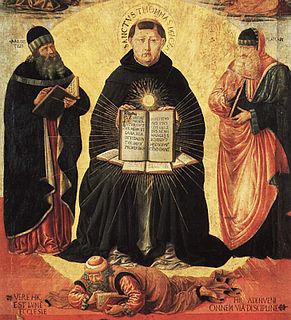 W
WThomism is the philosophical school that arose as a legacy of the work and thought of Thomas Aquinas (1225–1274), philosopher, theologian, and Doctor of the Church. In philosophy, Aquinas' disputed questions and commentaries on Aristotle are perhaps his best-known works.
 W
WInfused righteousness forms the basis for the doctrine of justification in the Roman Catholic Church and is rooted in the theology of Thomas Aquinas. The doctrine states that through keeping the commands of Christ, regular confession and penance, and receiving the sacraments, God's grace/righteousness is "infused" in believers more and more over time, and their own "righteousness in the flesh" becomes subsumed into God's righteousness.
 W
WThe just price is a theory of ethics in economics that attempts to set standards of fairness in transactions. With intellectual roots in ancient Greek philosophy, it was advanced by Thomas Aquinas based on an argument against usury, which in his time referred to the making of any rate of interest on loans. It gave rise to the contractual principle of laesio enormis.
 W
WNeo-scholasticism, is a revival and development of medieval scholasticism in Roman Catholic theology and philosophy which began in the second half of the 19th century.
 W
WThe Peripatetic axiom is: "Nothing is in the intellect that was not first in the senses". It is found in Thomas Aquinas's De veritate, q. 2 a. 3 arg. 19.
 W
WThe principle of double effect – also known as the rule of double effect; the doctrine of double effect, often abbreviated as DDE or PDE, double-effect reasoning; or simply double effect – is a set of ethical criteria which Christian philosophers, and some others, have advocated for evaluating the permissibility of acting when one's otherwise legitimate act may also cause an effect one would otherwise be obliged to avoid. The first known example of double-effect reasoning is Thomas Aquinas' treatment of homicidal self-defense, in his work Summa Theologica.
 W
WThe Range of Reason is a 1952 book of essays by the Catholic philosopher Jacques Maritain. The text presents a Thomist philosophy regarding religion and morality. It contains a study of Atheism, titled "The Meaning of Contemporary Atheism", which has had a considerable impact on Catholic views of Atheism.
 W
WThomistic sacramental theology is St. Thomas Aquinas's theology of the sacraments of the Catholic Church. It can be found through his writings in the Summa contra Gentiles and in the Summa Theologiæ. As can be seen, Aquinas relied heavily on Scriptural passages, as well as the writings of various Church Fathers. St. Augustine says : "The visible sacrifice is the sacrament. This is the sacred sign of the invisible sacrifice. A thing is called a sacrament, either by having a certain hidden sanctity, and in this sense a sacrament is a sacred secret; or from having some relationship to this sanctity. A sacrament is a sign. Moreover, it is a sacred sign. Divine Wisdom provides for each thing according to its mode. Wisdom 7,1 : "she... ordered all things sweetly"; and from Matthew 25,15: "[she] gave to everyone according to his proper ability." It is a part of human nature to acquire knowledge of the intelligible from the sensible. A sign is the way one obtains knowledge of something else. The sacraments are the signs by which humans gain knowledge of spiritual and intelligible goods. Ephesians 5, 25-26: "Christ loved the Church, and delivered Himself up for it; that He might sanctify it, cleansing it by the laver of water in the word of life." St. Augustine says : "The word is added to the element, and this becomes the sacrament." Augustine : "It is impossible to keep men together in one religious denomination, whether true or false, except they be united by means of visible signs or sacraments." It is necessary for salvation that humans united together in the name of true religion. Therefore, sacraments are necessary for man's salvation. There are three reasons sacraments are necessary to the salvation of humans: First, it is in the nature of humans to be led by things corporal and sensible to things that are spiritual and intelligible. Second, by sinning, humans have subjected themselves to corporeal things. Therefore, it is proper that the remedy have a corporeal side, leading to the spiritual. Third, humans are prone to direct their activity towards material things. Sacraments are made necessary because humans have sinned. The main effect of the sacraments is grace, in particular those involving Virtues and Gifts. Grace perfects the soul and allow participation in the Divine Nature. Furthermore, the effects of the sacraments is justification. This is an interior effect. Romans 8,33: "God justifies." Therefore, the effects of the sacraments is justification. This is an interior effect. The power of the sacraments is from God, alone. It does not matter that the minister of the sacraments may be a sinner, or evil. Augustine : "He upon Whom you shall see the Spirit, ...that John did not know that our Lord, having the authority of baptizing, would keep it to Himself, but that the ministry would certainly pass to both good and evil men...What is a bad minister to you, wherever the Lord is good?"
 W
WAccording to St. Thomas Aquinas, the sacraments of the Church may be described in terms of their matter and form. This concept holds importance in the Lutheran, Catholic, Methodist, Eastern Orthodox, Oriental Orthodox, Moravian, and Reformed traditions.
 W
WThis article contains a selection of thoughts of Thomas Aquinas on various topics. It is not intended as a complete account of Aquinas's thought. Within Aquinas' thought is included the philosophical school of Thomism.